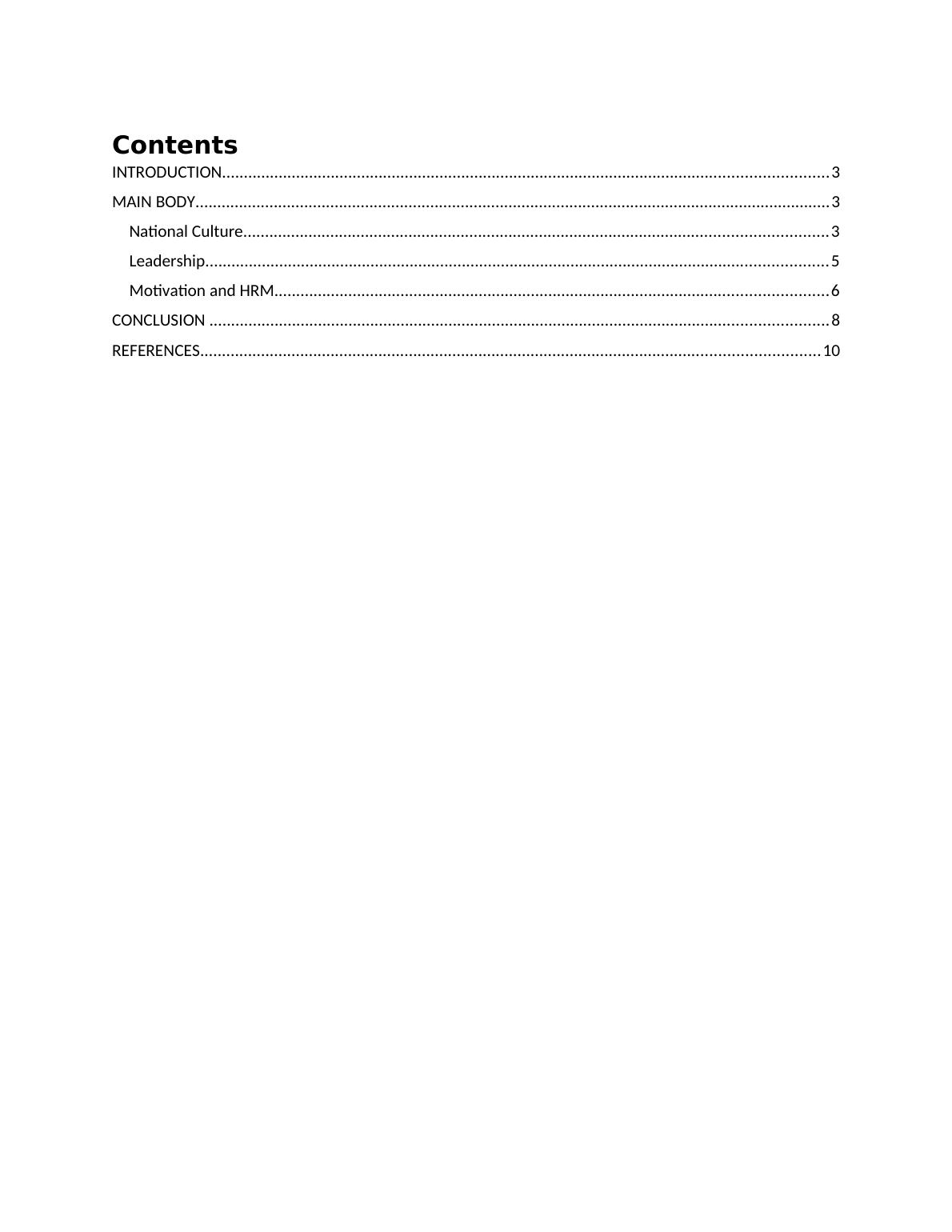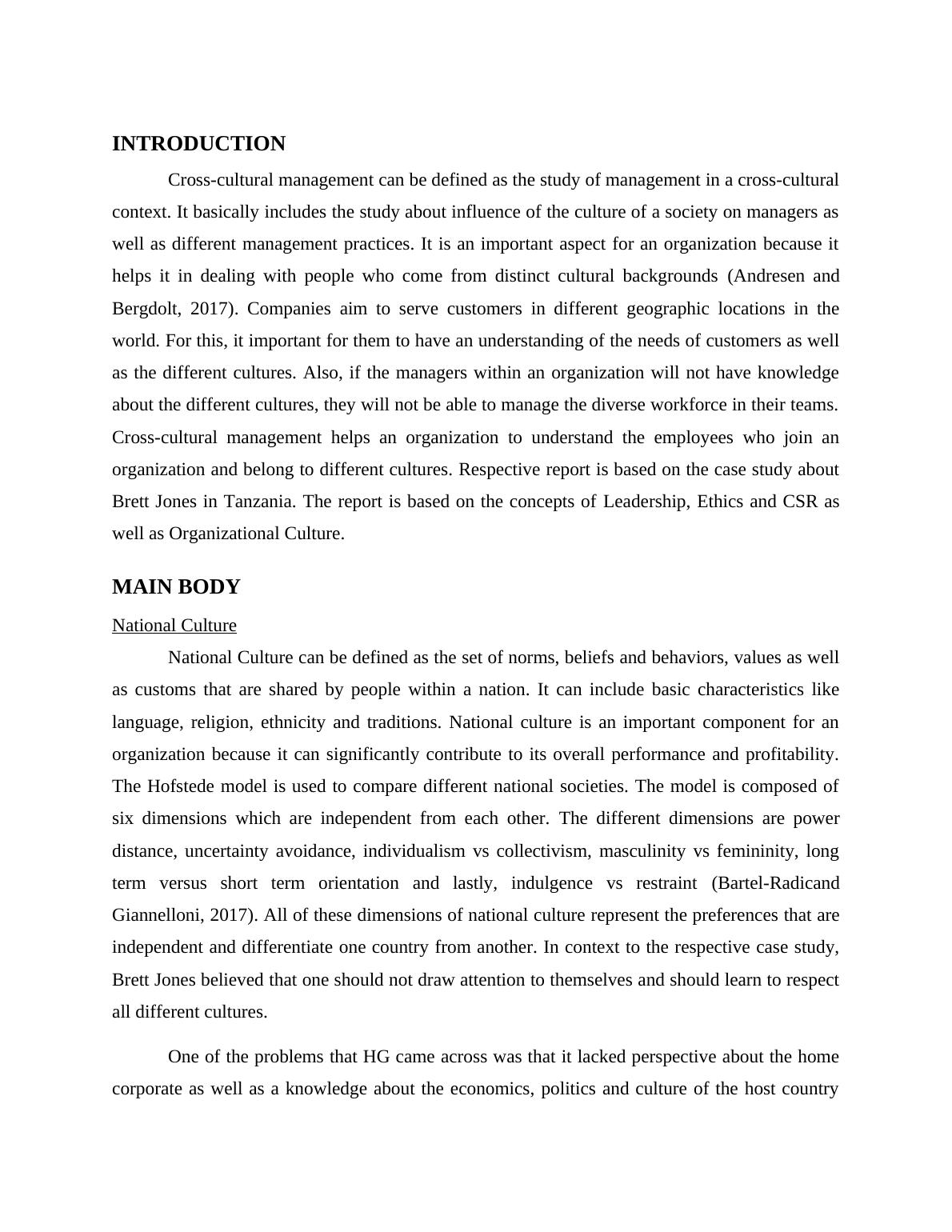Cross Cultural Management
Added on 2023-01-10
10 Pages3260 Words40 Views
Cross Cultural
Management
Management

Contents
INTRODUCTION...........................................................................................................................................3
MAIN BODY..................................................................................................................................................3
National Culture......................................................................................................................................3
Leadership...............................................................................................................................................5
Motivation and HRM...............................................................................................................................6
CONCLUSION ..............................................................................................................................................8
REFERENCES..............................................................................................................................................10
INTRODUCTION...........................................................................................................................................3
MAIN BODY..................................................................................................................................................3
National Culture......................................................................................................................................3
Leadership...............................................................................................................................................5
Motivation and HRM...............................................................................................................................6
CONCLUSION ..............................................................................................................................................8
REFERENCES..............................................................................................................................................10

INTRODUCTION
Cross-cultural management can be defined as the study of management in a cross-cultural
context. It basically includes the study about influence of the culture of a society on managers as
well as different management practices. It is an important aspect for an organization because it
helps it in dealing with people who come from distinct cultural backgrounds (Andresen and
Bergdolt, 2017). Companies aim to serve customers in different geographic locations in the
world. For this, it important for them to have an understanding of the needs of customers as well
as the different cultures. Also, if the managers within an organization will not have knowledge
about the different cultures, they will not be able to manage the diverse workforce in their teams.
Cross-cultural management helps an organization to understand the employees who join an
organization and belong to different cultures. Respective report is based on the case study about
Brett Jones in Tanzania. The report is based on the concepts of Leadership, Ethics and CSR as
well as Organizational Culture.
MAIN BODY
National Culture
National Culture can be defined as the set of norms, beliefs and behaviors, values as well
as customs that are shared by people within a nation. It can include basic characteristics like
language, religion, ethnicity and traditions. National culture is an important component for an
organization because it can significantly contribute to its overall performance and profitability.
The Hofstede model is used to compare different national societies. The model is composed of
six dimensions which are independent from each other. The different dimensions are power
distance, uncertainty avoidance, individualism vs collectivism, masculinity vs femininity, long
term versus short term orientation and lastly, indulgence vs restraint (Bartel-Radicand
Giannelloni, 2017). All of these dimensions of national culture represent the preferences that are
independent and differentiate one country from another. In context to the respective case study,
Brett Jones believed that one should not draw attention to themselves and should learn to respect
all different cultures.
One of the problems that HG came across was that it lacked perspective about the home
corporate as well as a knowledge about the economics, politics and culture of the host country
Cross-cultural management can be defined as the study of management in a cross-cultural
context. It basically includes the study about influence of the culture of a society on managers as
well as different management practices. It is an important aspect for an organization because it
helps it in dealing with people who come from distinct cultural backgrounds (Andresen and
Bergdolt, 2017). Companies aim to serve customers in different geographic locations in the
world. For this, it important for them to have an understanding of the needs of customers as well
as the different cultures. Also, if the managers within an organization will not have knowledge
about the different cultures, they will not be able to manage the diverse workforce in their teams.
Cross-cultural management helps an organization to understand the employees who join an
organization and belong to different cultures. Respective report is based on the case study about
Brett Jones in Tanzania. The report is based on the concepts of Leadership, Ethics and CSR as
well as Organizational Culture.
MAIN BODY
National Culture
National Culture can be defined as the set of norms, beliefs and behaviors, values as well
as customs that are shared by people within a nation. It can include basic characteristics like
language, religion, ethnicity and traditions. National culture is an important component for an
organization because it can significantly contribute to its overall performance and profitability.
The Hofstede model is used to compare different national societies. The model is composed of
six dimensions which are independent from each other. The different dimensions are power
distance, uncertainty avoidance, individualism vs collectivism, masculinity vs femininity, long
term versus short term orientation and lastly, indulgence vs restraint (Bartel-Radicand
Giannelloni, 2017). All of these dimensions of national culture represent the preferences that are
independent and differentiate one country from another. In context to the respective case study,
Brett Jones believed that one should not draw attention to themselves and should learn to respect
all different cultures.
One of the problems that HG came across was that it lacked perspective about the home
corporate as well as a knowledge about the economics, politics and culture of the host country

End of preview
Want to access all the pages? Upload your documents or become a member.
Related Documents
Cross Cultural Managementlg...
|5
|1160
|67
Cross Cultural Management: National Culture, Leadership, and Motivationlg...
|10
|2901
|60
Cross Cultural Management: National Culture, Leadership, and Motivation and HRMlg...
|11
|3737
|89
Cross Cultural Managementlg...
|7
|1690
|97
Cross Culture Managementlg...
|8
|2279
|20
Cross Culture Management: Influence of Societal Culture on Managers and Management Practicelg...
|10
|3156
|34
